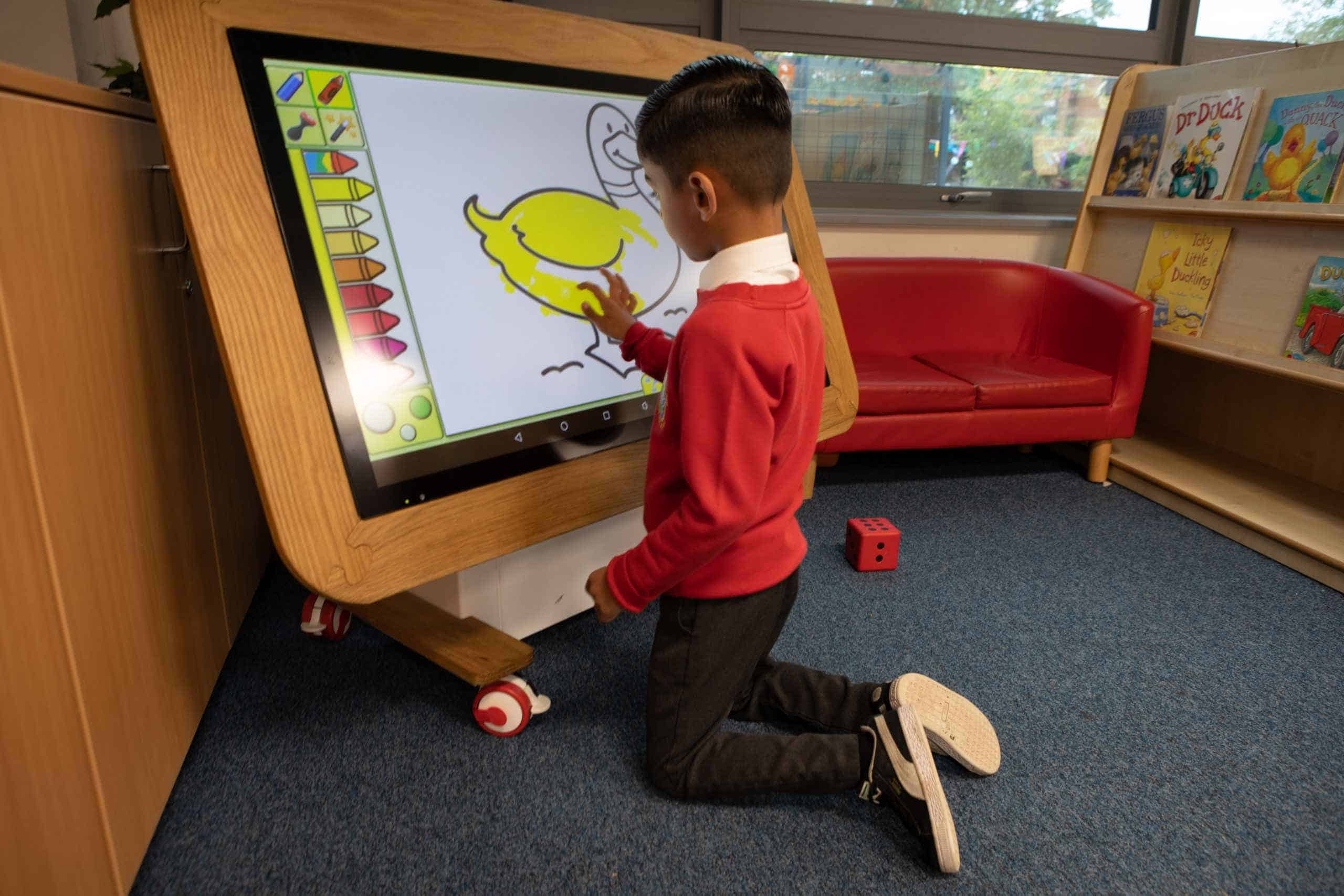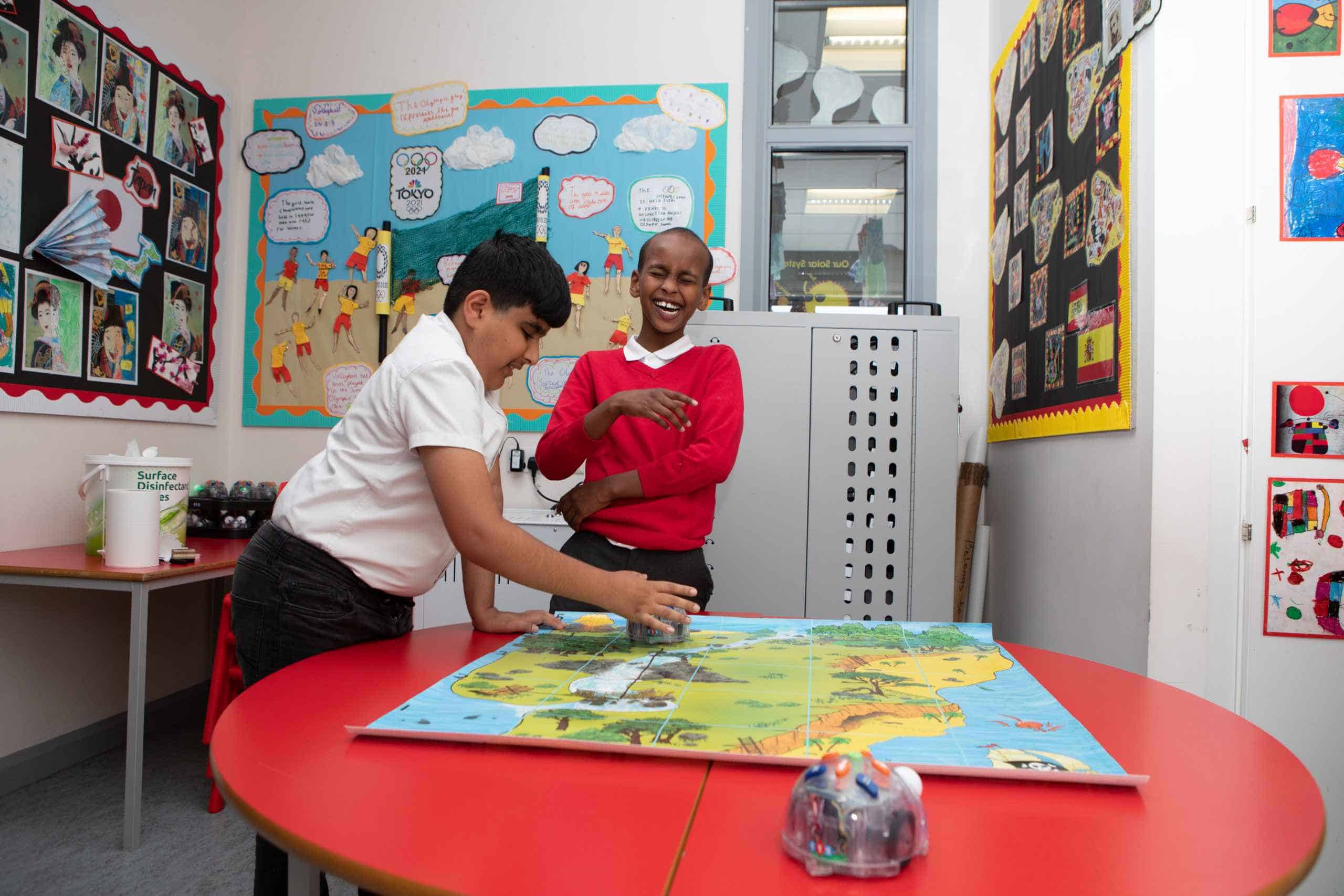



Computing and ICT
INTENT
Our carefully crafted curriculum balances the national expectations and an all-encompassing range of experiences allowing our children to flourish. Clear strategic planning allows the curriculum to be dynamic and adapt to the context of the school and children’s needs. Age related expectations combine the acquisition of knowledge and development of skills to create a purposeful and exciting learning journey for every child. The curriculum has high expectations to combine transferable skills, demonstrate a breadth of vocabulary and develop strong cross curricular links.
We have constructed a curriculum that is ambitious and designed to give all pupils at Clarendon, particularly the disadvantaged children and those with SEND, the knowledge and cultural capital they need to succeed in a digital world.
The Computing curriculum is developmental – reflecting on the previous year and evolving with new advances in technology. Currently we are using adapted Medium Term Plans from Bolton SICT and have created a bespoke curriculum and assessment system that meets the needs of our children. Each year the curriculum is reviewed and will take into account monitoring and pupil voice from the previous year, new initiatives, the SPD and the schools values, to ensure that the curriculum meets the needs of the children and the school each year. The Computing Curriculum for the current year can be found on the annual Curriculum Maps and changes are communicated with staff at the beginning of each year with regular, on-going peer support.
The Computing Curriculum is progressive and builds upon prior knowledge – in particular the vocabulary that is used – to ensure that children take small steps to become secure in the age related expectations. Lessons are inclusive and all children, no matter their background, have equal opportunity and access to Computing and ICT. During lessons, children are given the knowledge they need and the practical opportunities to apply computing (and other) skills – ensuring that understanding is embedded in the long term memory.
Children are also given a wide variety of opportunities to apply what they have learnt across the curriculum and the technological resources made available to them, allows for this real-life application. In particular the Computing team have worked closely with the Maths and Science teams to link the subjects together into STEM. This can be seen clearly with the STEM wow events that take place each term throughout the whole school i.e. Microbits and Sams Labs. The application of skills across a breadth of technology and subject areas develops children’s fluency and independence ensuring that they are set up for their future lives. Moreover, this wide variety of opportunities opens their eyes to a world of opportunities.
In addition to lessons and wow events, children have extra opportunities to engage with ICT and learn through the use of it through: assemblies, STEM Club, digital leaders and STEM ambassadors as well as out of school providing our children with a Learning Platform (including Purple Mash, My Maths, TT Rockstars and Spelling Shed).
IMPLEMENTATION
Throughout the year progression in the knowledge, skills and vocabulary of Computing as rigorously monitored to ensure that standards are maintained and children are meeting age related expectations. To ensure coverage has been met, the team will check teacher’s plans and assessment and will view children’s work to ensure that children are working at age related. The curriculum team also use pupil voice to measure the impact of the quality of education in computing and ICT. Where the team do not feel that children are moving forward at pace, feedback will be given to teachers and they are supported appropriately, through: peer coaching, team teaching and external CPD.
To measure progress of all children, particularly vulnerable groups, the team will analysis performance information and will use this as part of feedback to teachers as well as using it to reflect upon quality of education in Computing and ICT. Teacher’s subject knowledge is supported by computing subject leaders providing effective subject support for those staff members developing their expertise. Where necessary, external training and courses are provided to support teacher’s subject knowledge.
Teachers are supported in ensuring that they use effective methods to check children’s understanding systematically; identifying misconceptions accurately and providing clear, direct feedback. Assessment of children’s knowledge and skills is presented on year group specific assessment sheets, identifying gaps in learning for vulnerable groups, such as: EAL, INA, SEND and Disadvantaged children.
Our assessment sheets have been adapted from the Bolton SICT format, to reflect the learning needs of the children at Clarendon. Through the use of ‘I Can…’ statements we ensure effective coverage of the National Curriculum but incorporate an approach unique to our children’s needs. This leads to breadth and depth in computing subject knowledge and access to a wide range of resources leading to our children being better prepared for future jobs.
Our computing scheme of work ensures opportunities are provided for cross curricular links across a range of subjects. Our ambitious intentions relate to a coherently planned curriculum, sequenced towards cumulatively sufficient knowledge and skills for future learning and employment. These links are reflected on each year and reported back to staff at curriculum day. All children across the school have individual accounts and unique passwords for a range on online virtual learning environments, providing opportunities for home learning. These currently include access to: Purple Mash, Time Tables Rockstars, Spelling Shed and My Maths.
Outstanding classroom environments stimulate and engage quality thinking and reasoning. Explicit weekly and medium term planning is responsive to children’s needs; incorporating holistic approaches to teaching and learning. Peer coaching supports all staff to further develop curriculum pedagogy. Our marking policy is an opportunity for children to reflect on their learning and think deeply in their feedback.
IMPACT
The impact of a progressive curriculum that reflects on previous practise and moves forward with the changing times, is one which sees more children achieving ARE year after year. Teachers are more confident with their teaching of Computing due to the feedback, support and training given to them. Learning is at age related expectations and children are able to apply skills across the curriculum through a breadth of opportunities. Having access to a wide variety of technology and opportunities not only allows all children to embed learning into their long-term memory but also gives them the opportunity to develop their cultural capital and become educated citizens, giving them the best start to an aspirational live.


